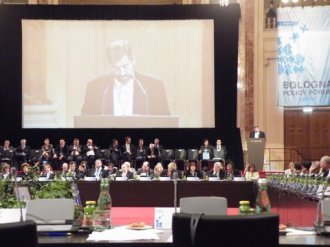
Source: "Bologna Policy Forum Keynote Speech – Building the global knowledge society: systemic and institutional change," Juan Ramón de la Fuente and Eva Egron-Polak, GlobalHigherEd, March 12, 2010
I quote:
(P)erhaps the most important development in the last couple of decades and a key driver of change is the very importance assigned to higher education as a sector today and the expectation that it can provide solutions or respond to society’s challenges. There is general consensus that no state, indeed no society, can afford to ignore how well its higher education and research sector is performing.....Comment: The explosive growth of colleges and universities is having an obvious beneficial effect. Half a century ago, when decolonization was in full swing there were newly formed countries without a single university graduate. On the other hand, the unbridled expansion is creating huge quality problems. I suspect that the quality range is especially great among private universities: some have gone to the private sector to create high quality by avoiding the limitations of public eduction in poor nations, while others enroll students in programs of execrable quality by avoiding regulation. JAD
Since 2003, when the first Shanghai Jiao Tong University ranking was first published, the global context has become the reference and research performance the undisputed measure of quality, despite continuous criticism. The failure, so far, for the most frequently used rankings to recognize that higher education fulfills other goals, is a real danger. Such goals as the provision of equitable access to enhance social cohesion, or the institution’s commitment in other efforts such as poverty alleviation, conflict prevention, cultural awareness and many other challenges often expressed within the framework of the Millennium Development Goals, cannot be ignored in any dynamic and context-sensitive measures of quality.....
In less than a decade – between 1999 and 2006 – the number of students enrolled in higher education increased roughly by 50% – from about 93 million to 144 million (UNESCO, 2009) and the growth trend appears to be stable for a few years to come.
The IAU maintains a world wide database on higher education which, in 1983 included approximately 9,000 universities and other higher education institutions in 153 countries. Today, the database has more than 18, 000 institutions in 183 countries. In one decade, China has doubled the number of HEIs and multiplied by 5 the number of students who are enrolled. In Ethiopia, in 2000 there were 34,000 students enrolled in higher education, in 2007 this number increased to 120,000.....
Today 30% of global higher education enrollment is in the private sector and it is the fastest growing part of the sector worldwide.
No comments:
Post a Comment